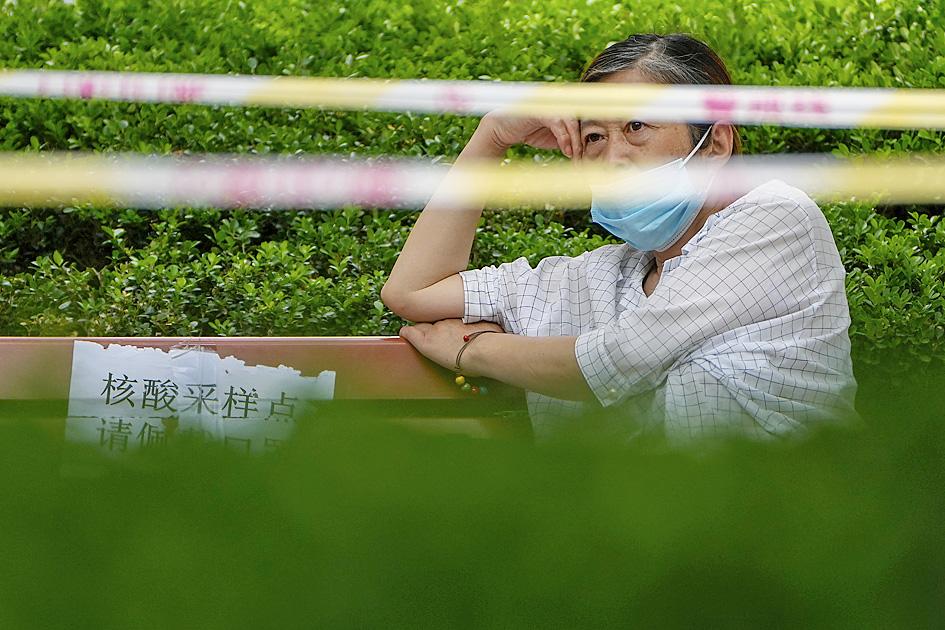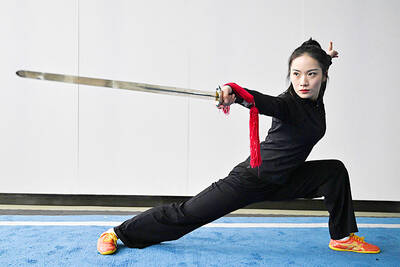China’s revised COVID-19 guidelines, which cut a quarantine requirement in half for inbound travelers, also create a standardized policy for mass testing and lockdowns when cases of the disease flare, showing that the country still has a zero-tolerance approach to the virus.
Chinese President Xi Jinping (習近平) solidified the position during a trip to Wuhan, where the pathogen first emerged in 2019, saying that China is capable of achieving a “final victory” over the virus.
The “zero COVID-19” policy is the most effective and economic approach for the country, Xi said during the trip on Tuesday, Xinhua news agency reported.

Photo: AP
The first update of the Chinese National Health Commission’s protocol since May last year sparked enthusiasm in financial markets and increased demand for travel by cutting quarantine time in half, with some analysts projecting that it might signal the start of China’s withdrawal from the “zero COVID-19” approach, which has largely cut it off from the rest of the world since 2020.
However, a closer reading of the document shows it is codifying critical COVID-19 policies that have widely varied until now, and lays the groundwork for faster and more extensive deployment of testing and lockdowns.
Even with reducing quarantine times to 10 days from as long as three weeks, China remains one of the most difficult countries to enter.
“They are modest steps that do not materially change China’s overall COVID stance,” S&P Global Ratings Asia Pacific chief economist Louis Kuijs said. “Indeed, as long as dynamic zero remains the overall guiding principle, new outbreaks pose serious risks to the economy.”
The move further consolidates and adjusts China’s “zero COVID-19” strategy given the more infectious nature of the Omicron variant of SARS-CoV-2, and explains how local officials are expected to deal with the virus in the future.
“The protocol comprehensively follows the dynamic zero policy,” health commission spokesman Mi Feng (米鋒) told a news briefing on Tuesday. “It’s not loosening control. The goal is to be more scientific and accurate.”
The guidelines detail testing and control measures for different levels of risks that can be implemented across China.
In areas classified as “high-risk,” where the virus has been detected in neighborhoods or workplaces, people are strictly banned from leaving their homes. The level would be downgraded to “middle-risk” after the area has been deemed virus-free for a week and everyone tests negative on the seventh day. Another three days without infections would put the area in the “low-risk” category.
For large cities, including provincial capitals and places with more than 10 million residents, mass testing should be conducted every day in virus-hit areas, stopping only when no community cases are found for three days in a row. Residents should undergo another round of tests three days later, ending only if there are still no new infections.
If the virus has spread across districts, provincial level health authorities would make the call on whether citywide testing is needed.
The standardized rules are also aimed at preventing local authorities from intensifying curbs on their own, a common phenomenon as municipal Chinese Communist Party officials fear angering Beijing by failing to execute “zero COVID-19” policies.
The rules were almost immediately put to the test, as the detection of 15 cases in central Anhui Province yesterday led to the lockdown of one county with 760,000 people.
Shanghai and Beijing, which battled outbreaks throughout the spring, reported no new local infections for Monday, a milestone that was seized upon as showing that Beijing’s strategy can be successful.
On Tuesday, the financial hub again reported no cases, while the capital reported one new case.

ANGER: A video shared online showed residents in a neighborhood confronting the national security minister, attempting to drag her toward floodwaters Argentina’s port city of Bahia Blanca has been “destroyed” after being pummeled by a year’s worth of rain in a matter of hours, killing 13 and driving hundreds from their homes, authorities said on Saturday. Two young girls — reportedly aged four and one — were missing after possibly being swept away by floodwaters in the wake of Friday’s storm. The deluge left hospital rooms underwater, turned neighborhoods into islands and cut electricity to swaths of the city. Argentine Minister of National Security Patricia Bullrich said Bahia Blanca was “destroyed.” The death toll rose to 13 on Saturday, up from 10 on Friday, authorities

Local officials from Russia’s ruling party have caused controversy by presenting mothers of soldiers killed in Ukraine with gifts of meat grinders, an appliance widely used to describe Russia’s brutal tactics on the front line. The United Russia party in the northern Murmansk region posted photographs on social media showing officials smiling as they visited bereaved mothers with gifts of flowers and boxed meat grinders for International Women’s Day on Saturday, which is widely celebrated in Russia. The post included a message thanking the “dear moms” for their “strength of spirit and the love you put into bringing up your sons.” It

In front of a secluded temple in southwestern China, Duan Ruru skillfully executes a series of chops and strikes, practicing kung fu techniques she has spent a decade mastering. Chinese martial arts have long been considered a male-dominated sphere, but a cohort of Generation Z women like Duan is challenging that assumption and generating publicity for their particular school of kung fu. “Since I was little, I’ve had a love for martial arts... I thought that girls learning martial arts was super swaggy,” Duan, 23, said. The ancient Emei school where she trains in the mountains of China’s Sichuan Province

DISASTROUS VISIT: The talks in Saudi Arabia come after an altercation at the White House that led to the Ukrainian president leaving without signing a minerals deal Ukrainian President Volodymyr Zelenskiy was due to arrive in Saudi Arabia yesterday, a day ahead of crucial talks between Ukrainian and US officials on ending the war with Russia. Highly anticipated negotiations today on resolving the three-year conflict would see US and Ukrainian officials meet for the first time since Zelenskiy’s disastrous White House visit last month. Zelenskiy yesterday said that he would meet Saudi Arabian Crown Prince Mohammed bin Salman, the nation’s de facto leader, after which his team “will stay for a meeting on Tuesday with the American team.” At the talks in the Red Sea port city of Jeddah, US